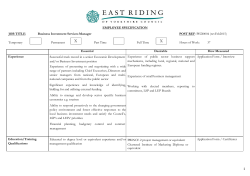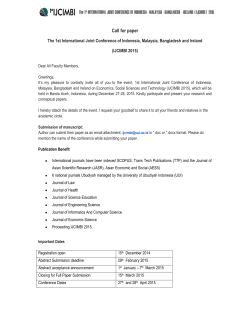
Jakarta Joint Declaration on the Realization of Asian
Jakarta Joint Declaration on the Realization of Asian-African Partnership for Progress and Prosperity We, the representatives of business delegations of Asian-African countries, gathered on April 21, 2015 in Jakarta, Indonesia for the Asian-African Business Summit under the theme “Realization of Asian-African Partnership for Progress and Prosperity”, held in conjunction with the Commemoration of the 60th Anniversary of 1955 AsianAfrican Conference and the 10th Anniversary of the New Asian-African Strategic Partnership. We are fully aware of the increasing globalization and rapid advancement of information and communication technology that have dramatically brought about significant changes in the world economic development, posing challenges as well as presenting opportunities for Asian-African countries. We firmly believe that both immediate and longer term development challenges require correct policy responses in order to achieve a stronger, more inclusive, and sustainable growth in Asian-African countries. Greater actions must be taken to foster development and transform developing countries into advanced and prosperous societies. In this regards we reaffirm the important role of private sector as an equal and complementary partner of the governments in identifying solutions and taking actions to promote development effectiveness. We emphasize that the private sector economic dynamism has potential to drive economic growth and sustainable development through promoting enterprises, creating jobs, providing goods and services, generating income and profits, and contributing to public revenues, which are critical to increasing countries' selfreliance and people’s decent livelihood. While acknowledging the differing objectives and priorities of the private and public sectors, we are cognizant of the vital role played by governments and other development actors in enabling and leveraging private sector’s role in these areas. We stress the importance of building up private sector engagement between private sector with governments in various forms, including investment, capacity building, knowledge sharing and innovation. We underscore the importance of such engagement in developing a more conducive environment for entrepreneurship, Page 1 of 3 domestic market growth, participation in international trade, and the realization of the full potential of human capital in the Asian-African countries. We agree to increase private sector’s role in advancing economic growth and sustainable development in Asian-African countries through the following joint actions: 1. Strengthen collaboration and partnership in expanding and diversifying trade as well as investment flows in both directions commencing with prioritized sectors, focusing on the involvement of small and medium enterprises. 2. Promote mutually beneficial trade cooperation among Asian-African countries by encouraging governments to eliminate trade barriers, refrain from the use of nontariff barriers to trade, enhance trade in goods and services, and improve trade facilitation in general within an open, fair and rule based international trading system. 3. Call upon governments, chamber of commerce, business associations and private sectors in general to take necessary and appropriate measures to increase direct trade between countries in Asia and Africa. 4. Encourage Asian-African countries to work more closely to promote policies and coordination for a more conducive investment climate. 5. Mobilize both foreign and domestic private sector investment by increasing investment promotion, improving product quality, marketing and skill development that are crucial factors to boost investment. 6. Give particular attention to boosting investment in priority sectors that make vital contribution to improve the livelihood of people in the two continents, such as agriculture and agro-business, manufacturing, construction, maritime, tourism, financing as well as handicraft and home industry. 7. Given the infrastructure bottlenecks hampering growth in most Asian-African countries and the need for better connectivity in the regions, encourage more efforts to mobilize private sector investment in infrastructure, such as roads, bridges, air and sea ports, railway, electricity, transport and telecommunication. 8. Foster collaboration in the fields of education, training and apprenticeship as well as in research and development to improve skills and entrepreneurship and facilitate the movement of skilled and semi-skilled labour. 9. Given the important role that small and medium enterprises could and must play and the lack of competitive enterprises that could act as suppliers to global value chain led by Asian and African companies, encourage governments to overcome their problem of access to market, finance, technology, and skill by conducting Page 2 of 3 enterpreneurship, education and training, facilitating joint marketing, and providing financial support. 10. In supporting private sector development, in particular the small and medium enterprises, call upon governments in collaboration with relevant stakeholders to improve policies, programmes, and instruments by encouraging public support policies in various areas including innovation promotion, entrepreneurship support, credit guarantees and private sector productivity. 11. Encourage public-private sector partnership to further promote South-South cooperation among Asian-African countries on the basis of equality and mutual benefit by advancing technical cooperation and capacity bulding as well as empowering small and medium enterprises. 12. Establish an Asian-African Business Council, as an open ended body with its Secretariat based in Indonesia and its Co-Secretariat based in South Africa, aimed at strengthening future economic and business collaboration among Asian-African private sector. The Council will meet at least once a year in AsianAfrican countries on a rotational basis. The inaugural meeting of the said Council will be held in Indonesia within six months. The Summit welcomes the readiness of Egypt to host the 2nd Meeting of the Asian-African Business Council in 2016. Jakarta, 21 April 2015 Page 3 of 3
© Copyright 2025









